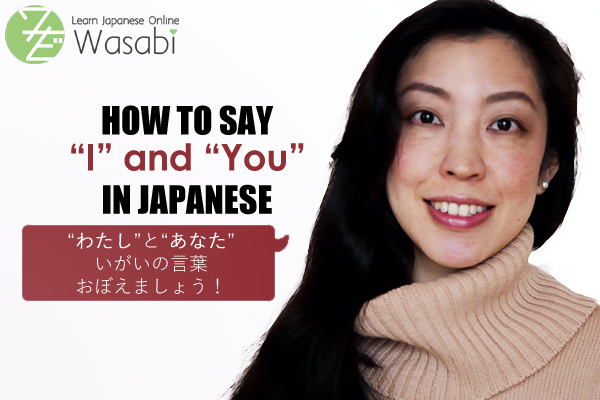All options for “I” and “You” in Japanese explained
Welcome back to another “Video & Article” series with tutor Wakako. In this article and video we will take a look at all the options you have for saying “I” and “You” in Japanese. Which version you should use depends heavily on who you are talking to in which situation and how you want to present yourself, so it’s important to know which versions are appropriate for you to use.
| Table of Contents [Introduction] [All the versions of “I” and how to use them] [All the versions of “You” and how to use them] |
[Introduction]
Do you have any specific version of “I” you use to refer to yourself in Japanese? Let’s take a look at all the options you have for saying “I” and “You” in Japanese. Obviously, the most common word for “I” is “私”, but there are many others you can use as well. Let’s start by taking a look at all the versions of “I” there are.
[All the versions of “I” and how to use them]
The variety for words meaning “I” in Japanese next to “私” includes “僕”, “俺”, “あたし”, and “わたくし”. Each of these words leaves a specific impression and thus has specific conditions or situations you can use it in. Which word you should use also depends on your gender identity and age.
“私” is the most basic and neutral word to mean “I”, and every adult can use it. Both adult men and women use “私” in formal situations as well.
However, a little boy or young boy wouldn’t use “私” because it sounds not only formal but also has a feminine touch. Hence, boys tend to use “僕”. “僕” is used only by men. Both boys and adult men can use “僕”, and it has a neutral if not slightly mild ring to it.
However, if you are an adult man, you can use “僕” only in casual situations, not in business situations. In the office it is more common to use “私”, even as a man.
“俺” is another word used only by men. It sounds more masculine and informal than “僕”. Many men and even little boys use “俺” in casual situations. “俺” is probably the most common word used by men in daily life.
“私” is used not only by adults. For little girls, “私” is a proper way to address themselves both in formal and casual situations. Some young adult women and little girls also use “あたし” in casual situations. “あたし” sounds more friendly and has a cute ring to it, compared to “私”.
“わたくし” on the other hand is a very formal way to address yourself. It is often used in business situations by both men and women when they are talking with clients and customers. Some women use “わたくし” in their private live, but it does sound very decent.
[adsense]
| 私 | Most basic and neutral form of “I”, used by all genders in all situations but has a formal and slightly feminine ring to it, also used by little girls |
| 僕 | Used by boys and men in casual situations, natural and slightly mild way of saying “I” |
| 俺 | Most common word used for “I” by men (and sometimes boys) in casual situations, never in business, sounds very masculine |
| あたし | Feminine and cute way of saying I, used by (young) adult women and little girls in casual situations |
| わたくし | Most formal, mostly gender-neutral way of saying “I”, used when talking to clients and customers, sometimes used by adult women |
[All the versions of “You” and how to use them]
Next, let’s take a look at “あなた”, which means “You”. While “あなた” is the most neutral form, other versions of “You” include “君”, “お前”, “あんた”, and “てめえ”.
“あなた” is the most neutral version of “You”. This is also the version you often see in Japanese textbooks. However, in actual conversation man do not often use “あなた” to say “You”. It does not exactly sound strange if a man says it, but it is simply more often used by women.
“君” is another casual but neutral word to mean “You” that is used by men and women equally.
“お前” is mainly used by men and gives a masculine, robust impression. It is very informal and sometimes impolite. You have to be very careful when using “お前”. It is reserved for very close friends and younger siblings, or sometimes for parents who address their children. Husbands sometimes use “お前” to address their wives as well, if the wife is comfortable to be called so. Women occasionally use “お前” as well, for example for their children, but it does sound quite rough.
“あんた” is also a very casual form of “You” and can also come across as impolite. It is mainly used by women. Many mothers use “あんた” when addressing their children in casual conversations or when scolding them. Wives also sometimes use “あんた” to address their husbands in casual situations.
The last version we are introducing is “てめえ”. You probably would never hear this used in an actual conversation, because “てめえ” is a very rude and impolite way to address a person. Basically, “てめえ” is used when the speaker is very angry and wants to express their hatred for the other person. You may have heard/read this in Anime or Manga, but it is probably best avoided to use in real life.
| あなた | Most neutral version of “You”, textbook Japanese, technically gender neutral but actually more used by women |
| 君 | Casual, neutral version used by both men and women |
| お前 | Very casual, impolite version used mostly by men, reserved for close friends and younger siblings, sometimes used by husbands to call their wives or mothers to call their children |
| あんた | Very casual, bordering on the impolite, used by women, wives to call their husbands, and sometimes mothers to call/scold their children |
| てめえ | Extremely impolite, angry and hateful version of “You”, reserved for fiction, Anime, & Manga |
That is all for today’s lesson. Which word do you usually use to address yourself? And did today’s lesson change your choice? There are many other ways to say “I” and “You” depending on the situation, so if you are interested, you can have a research by yourself.
If you have any questions, you can always clear them up by booking a lesson with one of our native Japanese tutors. See you next time!





